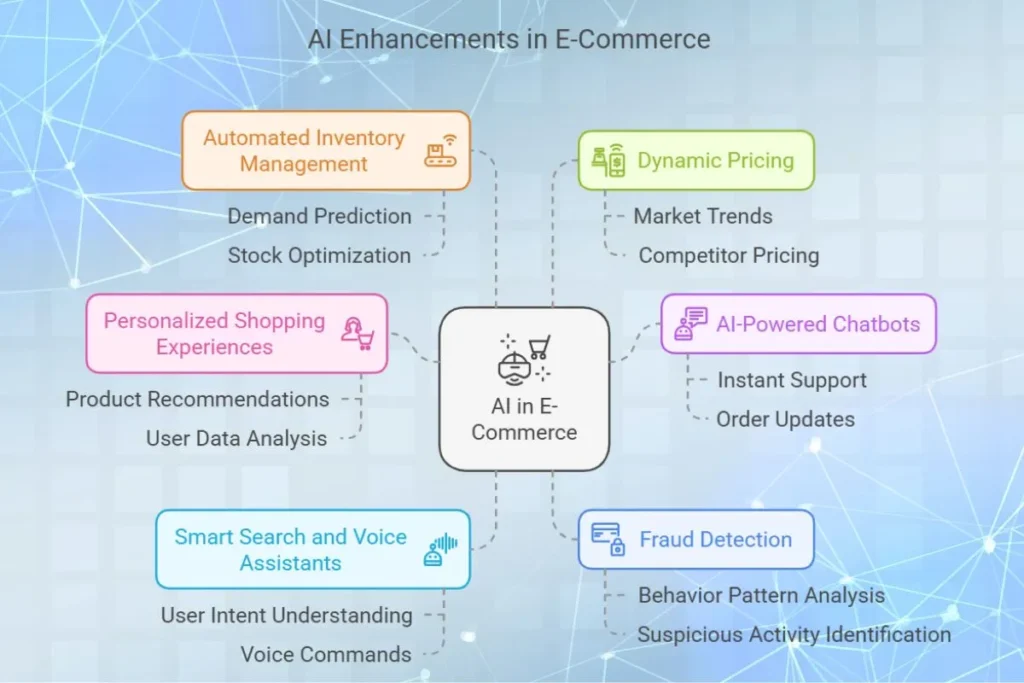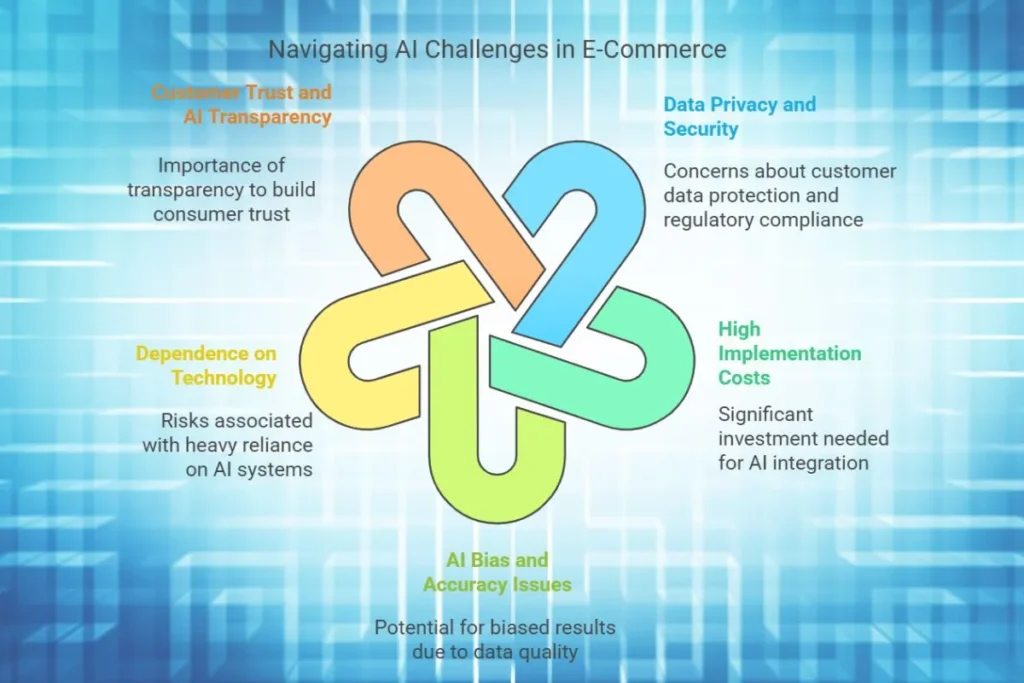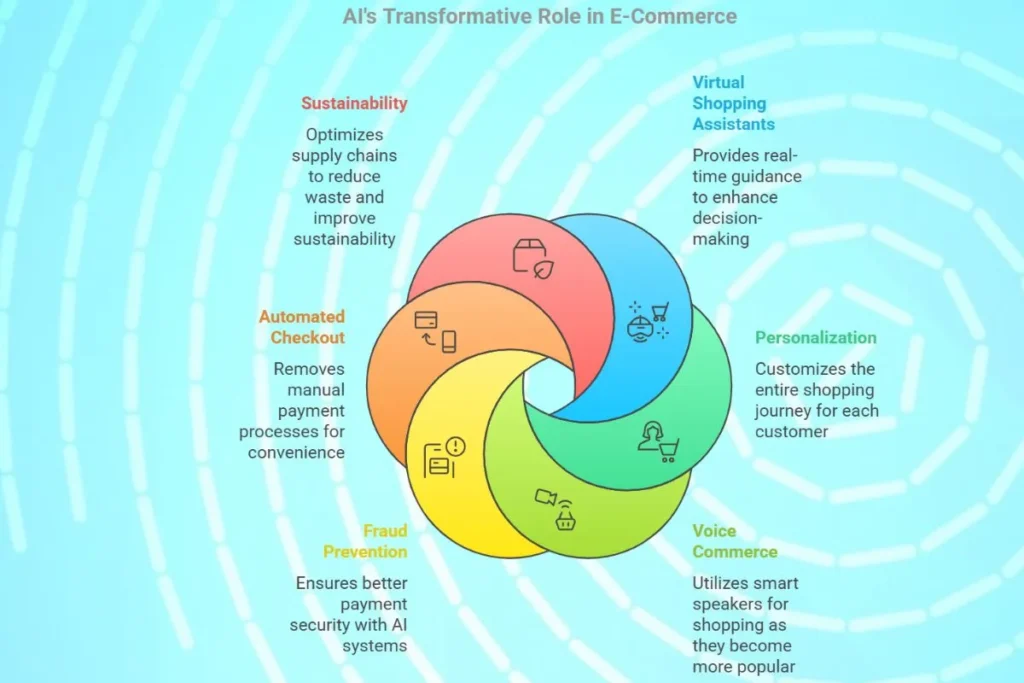Artificial intelligence (AI) has changed e-commerce sector by improving customer experiences, automating processes and optimizing business operations. Online retailers use AI technology to analyze consumer behavior, personalize shopping experiences and increase efficiency. AI helps businesses to predict trends, recommend products and streamline logistics, which makes online shopping faster and more convenient.
In this blog article we shall discuss about the role of artificial intelligence in e-commerce. Also we shall discuss how AI enhances e-commerce business, the challenges it faces and the future of e-commerce.
How Artificial Intelligence Enhances E-Commerce
AI enables e-commerce businesses to boost customer engagement, increase sales and operate efficiently. Here are the main ways AI is changing the industry:
1. Personalized Shopping Experiences
AI analyzes user data to provide customized product recommendations. Machine learning algorithms track browsing history, past purchases and interests to suggest relevant products.
Benefits:
- Higher customer engagement
- Increased conversion rates
- Improved user satisfaction
Amazon’s recommendation engine suggests products based on previous searches, which helps to boost sales and customer retention.
2. AI Powered Chatbots for Customer Support
AI chatbots handle customer queries, provide order updates and offer product recommendations. They operate 24/7, which reduces waiting times and improves customer satisfaction.
Benefits:
- Instant support
- Lower operational costs
- Consistent service experience
H&M’s AI chatbot helps shoppers to find clothing based on their style preferences and purchase history.
3. Smart Search and Voice Assistants
AI enhances search by understanding user intent. Voice assistants allow hands free shopping, which makes online shopping easier and faster.
Benefits:
- More accurate search results
- Better user convenience
- Increased voice search driven sales
Walmart’s voice search feature lets customers to add items to their cart using voice commands.
4. Fraud Detection and Secure Transactions
AI detects fraudulent transactions by analyzing behavior patterns and identifying suspicious activities.
Benefits:
- Reduced fraud related losses
- Enhanced payment security
- Greater customer trust
PayPal uses AI to monitor and prevent fraudulent transactions in real time.
5. Automated Inventory and Supply Chain Management
AI predicts demand, optimizes stock levels and automates warehouse operations to improve supply chain management.
Benefits:
- Fewer stock shortages and overstocking
- Lower operational costs
- Faster order fulfillment
Zara uses AI driven analytics to manage inventory based on real time sales data.
6. Dynamic Pricing Strategies
AI makes adjustments in prices in real time based on market trends, competitor pricing and customer demand.
Benefits:
- Competitive pricing
- Increased profitability
- Improved customer satisfaction
Uber’s AI based surge pricing adjusts fares during peak demand hours to optimize revenue.
7. AI Driven Product Recommendations
E-commerce platforms use AI to suggest complementary or alternative products to customers.
Benefits:
- Higher average order value
- Improved product discovery
- Enhanced shopping experience
Netflix uses AI driven recommendations, a concept widely applied in e-commerce.
8. Visual Search and Image Recognition
AI lets customers upload images and find visually similar products online.
Benefits:
- Faster product discovery
- More accurate search results
- Improved shopping convenience
Pinterest’s visual search tool allows users to find products using images.
9. Automated Email and Marketing Campaigns
AI improves email marketing by segmenting audiences, which optimizes e-mail sending times and personalizes content.
Benefits:
- Higher email open rates
- Better customer engagement
- Increased sales conversions
Mailchimp’s AI driven automation enhances email marketing effectiveness.
10. Customer Sentiment Analysis
AI monitors reviews, social media and feedback to gauge customer sentiment.
Benefits:
- Improved brand reputation
- Better customer relationship management
- Faster response to negative feedback
Starbucks uses AI technology to analyze social media feedback and refine marketing strategies.
11. AI Powered Virtual Shopping Assistants
AI driven assistants help customers to make better shopping decisions by providing real time guidance and support.
Benefits:
- Enhanced customer engagement
- Faster decision making
- Higher conversion rates
Sephora’s AI shopping assistant provides product recommendations based on customer preferences.
12. AI in Product Development and Trend Prediction
AI helps businesses to predict trends and develop new products based on customer preferences.
Benefits:
- Faster product innovation
- Better alignment with market demand
- Improved customer satisfaction
Fashion retailers use AI to predict trending styles and optimize inventory.

Challenges of AI in E-Commerce
Although AI in e-commerce has its benefits, it comes with following challenges.
1. Data Privacy and Security
AI relies on vast amounts of customer data, which raises concerns about privacy and compliance with regulations like GDPR.
2. High Implementation Costs
Integrating AI requires significant investment in technology, staff training and system upgrades.
3. AI Bias and Accuracy Issues
AI models can produce biased results if trained on incomplete or unbalanced data.
4. Dependence on Technology
Heavy reliance on AI can lead to issues if systems fail or generate incorrect recommendations.
5. Customer Trust and AI Transparency
Consumers may be skeptical of AI driven decisions, which makes transparency very important for trust.

The Future of AI in E-Commerce
AI will continue to shape e-commerce through development in technology. Future trends include:
- AI powered virtual shopping assistants to provide real time guidance and enhance decision making.
- Advanced AI driven personalization that customizes the entire shopping journey.
- Growth of voice commerce as smart speakers become more widely used.
- AI powered fraud prevention systems for better payment security.
- Automated checkout experiences to remove manual payment processes.
- AI enhanced sustainability efforts to optimize supply chains and reduce waste.
Businesses that embrace AI driven solutions will gain a competitive advantage by improving efficiency, enhancing customer experiences and increasing revenue.

Conclusion
AI is transforming e-commerce by personalizing shopping experiences, improving customer support and automating main business processes. From Businesses use AI to push growth and efficiency by using AI powered recommendations and fraud detection technologies etc.
AI based technology makes it a important tool for online retailers. Companies that invest in AI will increase customer engagement, improve efficiency and strengthen their position in the competitive e-commerce market.

